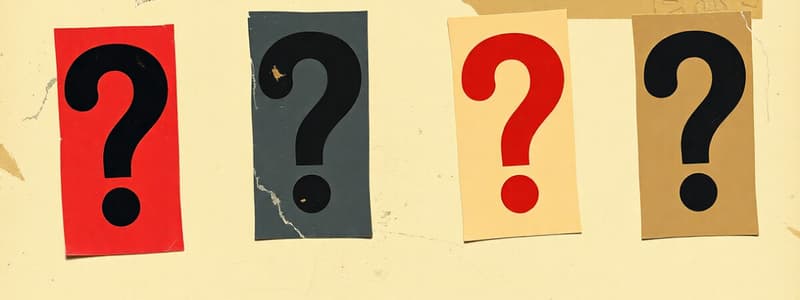Podcast
Questions and Answers
In the sentence, 'He studied for the exam last week, didn't he?', what is the role of didn't he?
In the sentence, 'He studied for the exam last week, didn't he?', what is the role of didn't he?
- It is an interrogative used to express doubt.
- It is an exclamatory phrase expressing surprise.
- It is a question tag used to confirm the statement. (correct)
- It is an example of a concluding remark.
Which sentence demonstrates the correct formation of a question tag?
Which sentence demonstrates the correct formation of a question tag?
- She wasn't happy with her grade, doesn't she?
- She wasn't happy with her grade, was she? (correct)
- She wasn't happy with her grade, is she?
- She wasn't happy with her grade, wasn't she?
What is the main purpose of using question tags in conversation?
What is the main purpose of using question tags in conversation?
- To provide a complex grammatical exercise.
- To seek confirmation or to engage the listener. (correct)
- To confuse the listener with ambiguous statements.
- To express disagreement with the speaker.
In the example, 'They didn't arrive on time, did they?', what does the question tag did they imply?
In the example, 'They didn't arrive on time, did they?', what does the question tag did they imply?
Which response correctly completes the sentence: 'Mia was happy, ______'?
Which response correctly completes the sentence: 'Mia was happy, ______'?
Spongebob says, 'I went to the beach on Saturday.' How does Patrick use a question tag to respond?
Spongebob says, 'I went to the beach on Saturday.' How does Patrick use a question tag to respond?
If Spongebob says, 'Yes, it was really fun! I swam in the ocean.' How would Patrick use a question tag effectively?
If Spongebob says, 'Yes, it was really fun! I swam in the ocean.' How would Patrick use a question tag effectively?
Spongebob says, 'I did! It was a bit cold, though.' Which question tag would Patrick use to respond?
Spongebob says, 'I did! It was a bit cold, though.' Which question tag would Patrick use to respond?
Ahmed slept late yesterday, ______?
Ahmed slept late yesterday, ______?
Mona didn't eat her lunch, ______?
Mona didn't eat her lunch, ______?
Ali was with his friend last week, ______?
Ali was with his friend last week, ______?
They were in the cinema, ______?
They were in the cinema, ______?
Complete the question tag: You traveled to London last year, ______?
Complete the question tag: You traveled to London last year, ______?
Ali studied English two years ago, ______?
Ali studied English two years ago, ______?
Sara didn't write her homework yesterday, ______?
Sara didn't write her homework yesterday, ______?
It was raining yesterday, ______?
It was raining yesterday, ______?
The boys were playing football in the park, ______?
The boys were playing football in the park, ______?
Mr. Adam wrote the homework on the board, ______?
Mr. Adam wrote the homework on the board, ______?
Rewrite the following sentence with a question tag in the simple past: Alia (go) with her friends to the cinema.
Rewrite the following sentence with a question tag in the simple past: Alia (go) with her friends to the cinema.
Rewrite the following sentence with a question tag in the simple past: Robert Pershing Wadlow (be) the tallest man ever lived.
Rewrite the following sentence with a question tag in the simple past: Robert Pershing Wadlow (be) the tallest man ever lived.
Rewrite the following sentence with a question tag in the simple past: Fahad (not know) the assignment is due tomorrow.
Rewrite the following sentence with a question tag in the simple past: Fahad (not know) the assignment is due tomorrow.
Complete the conversation using a question tag in the simple past: A: My mother didn't buy me a new school uniform, ______?
Complete the conversation using a question tag in the simple past: A: My mother didn't buy me a new school uniform, ______?
Complete with a question tag in the simple past: A: The players ______ B: Yes, they trained very well. (Being ready for the football match.)
Complete with a question tag in the simple past: A: The players ______ B: Yes, they trained very well. (Being ready for the football match.)
Complete with a question tag in the simple past: A: We ______ B: (Getting an invitation for the show.)
Complete with a question tag in the simple past: A: We ______ B: (Getting an invitation for the show.)
Complete with a question tag in the simple past: A: ______ B: (Not being on time for the meeting.)
Complete with a question tag in the simple past: A: ______ B: (Not being on time for the meeting.)
How would you categorize the purpose of the sentence 'We had a great time, did we?'
How would you categorize the purpose of the sentence 'We had a great time, did we?'
What does 'She didn't call you, was she?' imply?
What does 'She didn't call you, was she?' imply?
What is indicated by the question tag in 'You were at the party, didn't you?'?
What is indicated by the question tag in 'You were at the party, didn't you?'?
Choose the correct word to complete the sentence: I'm sorry I couldn't attend the party because my _________ was busy.
Choose the correct word to complete the sentence: I'm sorry I couldn't attend the party because my _________ was busy.
Which word best completes the sentence: The characters in the story are not real. They are _________.
Which word best completes the sentence: The characters in the story are not real. They are _________.
Based on the communication paragraph, what's the most accurate description of communication's role in life?
Based on the communication paragraph, what's the most accurate description of communication's role in life?
According to the communication paragraph, how can one improve their communication skills?
According to the communication paragraph, how can one improve their communication skills?
In the communication paragraph, what is regarded as an effective teacher for improving communication skills?
In the communication paragraph, what is regarded as an effective teacher for improving communication skills?
Flashcards
What are Question Tags?
What are Question Tags?
Question tags are short questions at the end of statements, used to confirm information or seek agreement.
When do we use question tags?
When do we use question tags?
Used to ask if something is true, or to ask people to agree with us.
Topic Sentence
Topic Sentence
A sentence that introduces the main point or argument of a paragraph.
Supporting Details
Supporting Details
Signup and view all the flashcards
Concluding Sentence
Concluding Sentence
Signup and view all the flashcards
Fictional
Fictional
Signup and view all the flashcards
Schedule
Schedule
Signup and view all the flashcards
Study Notes
- Question tags are used to ask if something is true.
- Question tags are used to ask people to agree with a statement.
Question Tag Examples
- "I met you yesterday, didn't I?" illustrates a question tag.
- "She wasn't playing, was she?" shows another use of question tags.
- A question tag for family watching a movie last night is "Didn't they?".
- A question tag for cat ate the food yesterday is "Didn't it?".
- A question tag for studying for an exam last week is "Didn't he?".
- A question tag for wasnt happy with her grades is "Was she?"
- A question tag for didn't arrive on time is "Did they?".
- The question tag for "He rode a horse" is "Didn't he?".
- The question tag for "The mother wasn't alone," is "Was she?".
- The question tag for "Mia was happy," is "Wasn't she?".
- The question tag for "They didn't arrive on time," is "Did they?".
- When Spongebob says "I went to the beach on Saturday," Patrick confirms with "You went to the beach, didn't you?".
- When Spongebob says "Yes, it was really fun! I swam in the ocean," Patrick replies with "You swam in the ocean, didn't you?".
- When Spongebob says, "I did! It was a bit cold, though," Patrick responds with "It was cold, wasn't it?".
Vocabulary Quiz
- The characters in the story are fictional.
- If one is unable to attend the party because their schedule was busy.
Studying That Suits You
Use AI to generate personalized quizzes and flashcards to suit your learning preferences.




